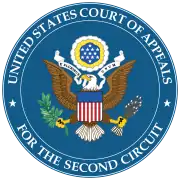United States Naval Institute v. Charter Communications, Inc.
United States Naval Institute v. Charter Communications, Inc., 936 F.2d 692 (2d Cir. 1991),[1] is a U.S. federal court case. A contract case, it discusses the impropriety of punitive damages and favoring the theory of efficient breach.
| United States Naval Institute v. Charter Communications, Inc. | |
|---|---|
 | |
| Court | United States Court of Appeals for the Second Circuit |
| Full case name | United States Naval Institute v. Charter Communications, Inc., and Berkley Publishing Group |
| Argued | January 7, 1991 |
| Decided | June 18, 1991 |
| Citation(s) | 936 F.2d 692 |
| Case history | |
| Prior action(s) | 875 F.2d 1044 (2d Cir. 1989) |
| Court membership | |
| Judge(s) sitting | Amalya Lyle Kearse, Ralph K. Winter Jr., Frank X. Altimari |
| Case opinions | |
| Majority | Kearse, joined by a unanimous court |
| Contract law |
|---|
 |
| Part of the common law series |
| Contract formation |
| Defenses against formation |
| Contract interpretation |
| Excuses for non-performance |
| Rights of third parties |
| Breach of contract |
| Remedies |
| Quasi-contractual obligations |
| Related areas of law |
| Other common law areas |
Case procedure and summary
U.S. Naval Institute, as the assignee for the book The Hunt for Red October, sued Charter Communications and Berkley Publishing Group for breach of a licensing contract. The contract was an exclusive license to publish a paperback edition of the book, not sooner than October 1985. The publishers breached this contract by initiating retail sales on September 15, 1985. Early sales were substantial enough to put the book near the top of paperback best seller lists before the end of September.
Naval lost its suit for a preliminary injunction to prevent these sales. The District Court ruled that Berkeley had not breached the contract, because it was to ship before the agreed publication date, which was industry custom. However, the Circuit court reversed this holding and determined that the contract was breached.[2]
On remand, the trial court concluded that the damages Naval was entitled to not merely actual damages for copyright infringement, but also recovery of profits wrongfully received by Berkeley (in the month of September) for that infringement.
Holding
No. Damages for breach of contract are supposed to compensate the injured party for the loss caused by the breach. Those are measured by the plaintiff's actual loss.
- While defendant's profits are on occasion used to measure damages, this generally occurs when those profits help to define the plaintiff's loss.
The object behind contract remedies is to compensate, not to punish. Punitive damages are only recoverable from a breach of contract if the conduct that constitutes the breach is also a tort [Subsection 355, Restatement (Second) of Contracts].
References
- United States Naval Institute v. Charter Communications, Inc., 936 F.2d 692 (2d Cir. 1991).
- United States Naval Institute v. Charter Communications, Inc., 875 F.2d 1044 (2d Cir. 1989).